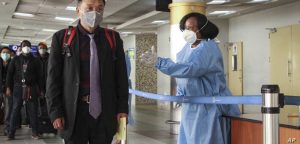By Jane Njuru
As the scourge of Coronavirus continues to ravage the world, one thing is clear: the world has changed irreversibly. Many things are going to change post coronavirus and life will never be the same again. In the field of education, economy, transport and communications, and entire social relations, it is important for countries and individuals to reorder their priorities. Specifically, Kenya and perhaps other African countries will experience a complete change in different sectors.
The Coronavirus-inspired social distancing culture has altered public and private events remarkably. For example, the conventional formats for hosting events such as funerals and huge weddings attended by family, friends, and community might become a thing of the past. Before now, couples spent years and months to organize mega dream parties. In some instances, it took more time to organize weddings that the longevity of the marriage itself. Now is the time to rethink the importance of those mega wedding and reception parties. Some poor couples are forced to ask for financial support through pre-wedding parties as they try to compete with one another in terms of best venues, quantity and quality of guests.
Similarly, funerals in Kenya will henceforth take a different tone. Until now, burials in Kenya have turned into perfect domes where politicians make declarations and throw unwarranted insults at their real or perceived political opponents with little or no respect for the bereaved families. Helicopters are used as bicycles to get to the burial venues with ultimate aim of making headlines and gaining political mileage. Millions are spent to mount mega tents just to leave the bereaved community more miserable and sad!
As the Ministry of Health continues the fight against COVID-19, it is about time the Ministry of Education gets to the drawing boards. Life is hardly going back to normalcy sooner. Since the implementation of free primary and secondary schools in Kenya, public schools have become congested. In fact, congestion is an understatement. The teachers rarely have a little space to put their desks & table. Students on front row almost touch the board with their noses. We must think outside the box on how to handle the huge numbers in our schools. Otherwise, if we are spared from the first wave of COVID-19, you dread to imagine how another unexpected wave of a similar or worse virus would kill our children like locusts in the overcrowded schools.
The private schools are not doing better either in terms of handling student population. Kenya has tasted the misery of dormitory fire accidents. A visit to just a few private schools would reveal the sad state of affairs where children are packed up like drumsticks and violating all rules about social distance. Yet, we have personnel assigned with the responsibility of ensuring quality and safety guidelines as mandated by the ministry. These public servants wake up each day and head to work in smart suits and red ties but absolutely do nothing that is stated on their job description. When young minds get accustomed to lack of order, unhygienic culture, and general disrespect of the regulations, then it becomes absolutely difficult to expect them as adults to follow the rule of law.
In the transportation arena, the Ministry of Transport’s delay in stopping the international flights early enough may not attract so much criticism because a lot of consultations preceded such decision. However, some of the worst hit demographics have never in their wildest dreams imagined using a plane. Now, they are dealing with a foreign virus brought by planes. It almost feels like a disease brought home by a cheating partner. It’s painful. The consequences of this virus don’t care who the culprits are. The whistle-blower of the plane from China, which was the epicenter of the virus was interdicted and cajoled as unpatriotic.
Meanwhile, during coronavirus lockdown, Kenyans expect the Transport Cabinet Secretary to be busier than his Health counterpart. This is the time to address all the flooding experienced in Nairobi and elsewhere before the rain starts pouring. This is the time to repair all the potholes on our roads and drainage muddle. This is the time to address the heavy traffic mess. This is the crucial time to rethink and come up with strategies on how to ease transport problems in the cities and implement real changes. Let Kenyans feel it was worthwhile working from home for a few who are lucky to have flexible jobs. Reward those who are on unpaid leave or who lost their jobs. Take maximum advantage of the empty roads and highway to make transformational changes.
The Minister in charge of Information, Communications, and Technology – ICT has proposed that students should learn online, yet, over 75% of Kenyans dwell in semi slums or real slums with limited access to technology. Although most Kenyans use mobile phone, a negligible percentage of citizens are connected to Wi-Fi or own computers. It’s painful to look at the data.
While President Paul Kagame of neighboring Rwanda took ICTs in education very seriously, the same cannot be said of Kenya. President Kagame launched One Laptop per Child (OLPC) program with the aim of moving from an agricultural to a knowledge-based economy. He made sure the infrastructure was comprehensively done He created an office in his State House and officiated events focused on developing teacher skills and creative uses for computers in the classroom to help teachers make this education project their own. All the Head teachers were thoroughly trained plus about four teachers from each school who acted as ICT champions. Such a systematic approach would have made it easier to incorporate e-learning in the educational system now that students are at home due to Coronavirus-motivated lockdown. Homework can be loaded into their “little” machines. It would be interesting if the Ministry can provide regular updates on the one-laptop-per-child policy in Kenya. More importantly, the Ministry may explain how practically online learning can take place in the slums.
The impact of the global pandemic on Kenya’s foreign policy is clear for everyone to see. The horrible spectacle of recent videos of Kenyans and other Africans being maltreated in Chinese city of Guangzhou as criminals is a case in point. The city is the hub of the country’s export-driven manufacturing sector. An industry which has always been considered open, tolerant and progressive today is pointing a finger at Africans for the imported coronavirus cases and second wave of the pandemic. The racist acts linger in China while African leaders continue to lay red carpets for Chinese nationals in Kenya. They not only enjoy our fresh foods and great environment but also our young girls with impunity.

Even as the government operates in very difficult circumstances, the post coronavirus period might bring some positive developments leading everyone to do things a little bit differently. It might be a blessing in disguise as people’s perspectives and priorities change significantly.
Kenyans and the world are in a war against COVID-19 together as one human family. What goes around comes around. One careless and mindless person can infect hundreds with the virus. We are not safe if one of us has the virus. This is the time to think of policies that can improve the lives of the people.
The underlying message of COVID-19 is that all Kenyans are equal and required to wear face masks while in public. What an equalizer? Does anybody care whether the face mask is designed or produced abroad or not? I don’t think so. This should be the new perspective. Instead of focusing on vanity and sweating small stuff like the designer of products, Kenyans should focus on the big picture.
Dr. Jane Wangari Njuru, Ph.D. is the Executive Director of Professional Edge, Nairobi







Hitting the nail on the head.
Good work! Telling like it is.
Hitting the nail on the head.
Good work!